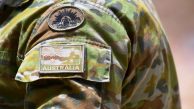
The Urgent Need for Action: “Transforming Veteran Support Systems”
By Ray Payne OAM – Frontline
Last week marked a significant turning point for veterans and their families with the release of the final report from the Royal Commission into Defence and Veteran Suicide. With over 5,889 submissions, 886 private sessions, 346 witness statements, and the review of 230,000 documents, the systemic failures of the support systems designed for our servicemen and women have finally been exposed. For the first time in years, the hidden struggles of Australia’s 581,000 veterans and their 450,000 family members are being brought to light.
Our Defence Force excels at protecting our country, often without demanding the recognition they deserve. However, this silence has also left many veterans feeling voiceless when the system lets them down. The Royal Commission has forced us all to confront these uncomfortable truths about how some veterans have been treated.
While it’s easy to expect the government to fix this, history has shown us that waiting for government action alone isn’t enough. Veteran organisations, like the RSL and all our other veteran associations, need to step up and hold both the government and Defence accountable. It’s not enough to assume that change will happen on its own. These organisations are in a unique position of influence, with direct access to the communities most affected, and must ensure that the momentum created by this inquiry leads to tangible, lasting reforms.
Because of my involvement with veterans over the past 50 years I’ve seen firsthand how the system can break down those it’s supposed to protect, and I know many have endured far worse. We can no longer afford to tinker around the edges of this problem. What we need is a complete overhaul…a systemic transformation that proactively supports veterans and their families, preventing harm before it happens.
Veteran organisations, particularly the RSL and veteran associations, must play a critical role in ensuring that the momentum created by the Royal Commission leads to real change. These organisations need to go beyond offering support…they must become vigilant advocates, closely monitoring the government’s actions and holding Defence accountable for implementing the required reforms. This isn’t just about making noise; it’s about making sure that promises aren’t empty and that real, tangible improvements are made.
The task ahead is monumental, and without the persistent pressure from veteran associations, there is a risk that these issues will be pushed to the sidelines once again. The RSL and other veteran organisations have a responsibility to ensure that the findings of the commission don’t gather dust but are acted upon swiftly and effectively. They must track progress, challenge delays, and keep these issues front and centre in the national conversation.
If we allow this burden to fall on the next generation of veterans, we will have failed them. The future of our veteran community rests on the actions we take today, and it is the role of these organisations to make sure that every step is taken with purpose and urgency. This is a once-in-a-lifetime opportunity to build a system that genuinely supports and protects our veterans and their families. It’s a task that cannot be left to government alone…veteran organisations must be at the forefront, leading the charge, and making sure Australia honours its commitment to those who have given so much.





I have a different view on who should be at the forefront of enacting the recommendations of the Royal Commission. ESOs and the RSL should be removed from doing anything with the recommendations of the Commission. They have no track record on doing anything why should affected veterans believe that after all this time they should now take a lead role?
Gary Burgess September 19, 2024
Gus who would you suggest to take on this task, if not ESOs or the RSL who else is there?
Interesting perspective Gus Robertson. The question really is how best and by whom can these recommendations be implemented in the fastest way possible. I personally don’t have the answer as I am to far removed.